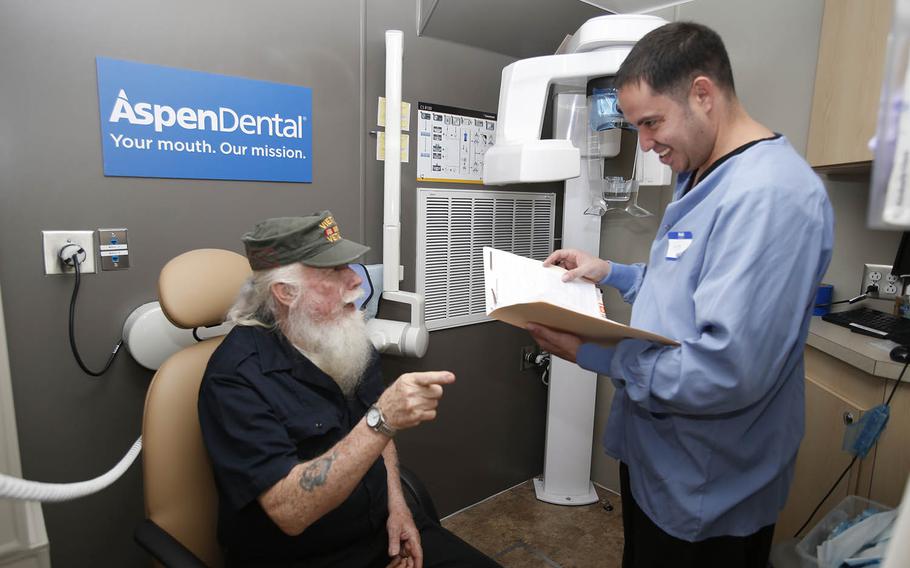
An Aspen Dental volunteer serves Navy veteran John Stinman on the MouthMobile, a 42-foot dental office on wheels, in Phoenix, where this year’s 30-stop tour started. (Rick Scuteri, AP Images/Aspen Dental Management Inc.)
After returning home from my service in the Air Force, I was beyond amazed by the warm welcome on Veterans Day as businesses and neighbors took the extra time to make me feel at home.
As a full-on civilian now, I am lucky to have had my reintegration into society as seamless as it has been and truly thankful that I have my health and business success. Yet, as a dentist, I know firsthand that many veterans still face serious health issues — especially with their teeth. While veterans are eligible for medical benefits through the Department of Veterans Affairs, they do not receive government dental benefits unless they are classified as 100 percent disabled, have a service-connected dental condition, or have a service-oriented medical condition that is affected by their mouth — requirements that many veterans do not meet. It’s quite evident when I meet a veteran who has just shown up at my office after not going to a dentist for a decade.
Unfortunately, many Americans are unaware of this issue and why I think it has been overlooked. In a recent survey, only 44 percent of Americans were aware of the full criteria that must be met for a veteran to be eligible for dental benefits through the VA while almost 2 in 5 respondents (37 percent) believed that all U.S. veterans received dental benefits for their service.
Only 12 percent of respondents considered access to dental care to be one of the top three challenges veterans face — important issues like readjusting to civilian life (63 percent), finding employment (61 percent) and accessing medical care (47 percent) were most frequently ranked at the top. This is unfortunate when you realize that each of those issues are directly related to oral health.
I’ve seen the sometimes devastating impact delaying dental care can have on my veteran patients — both old and young — and the obstacles they face because of it. I’ve learned from my patients that their poor oral health has hindered their self-confidence, has made it difficult for them to share a smile, and has played a role in their inability to secure employment.
In order to help my fellow veterans this year, I volunteered my time on the Aspen Dental MouthMobile in Lexington, Ky. — where we gave free dental care to veterans on this 42-foot dental office on wheels. The MouthMobile is one component of a larger community-giving initiative, called the Healthy Mouth Movement, that has helped more than 4,000 veterans across the country receive free, and much-needed, dental care totaling $2 million this year alone.
Helping our veterans get back to good oral health is key in helping them transition back into civilian life. In fact, three-quarters of Americans agree that good oral health can result in improved self-esteem, greater confidence and higher employment opportunities — three core components of a successful reintegration.
I call on Americans, especially the veterans who have been as lucky as I have been, to not only salute those who served but also recognize the challenges many of our veterans face, especially when it comes to their health. In doing so, we can better identify ways to empower this community of people who have already done so much to empower us.
John Ihnen, DMD, who served in the Air Force, is owner and lead dentist at the Aspen Dental practices in Louisville and Lexington, Ky., and Somerset and Clarksville, Ind.